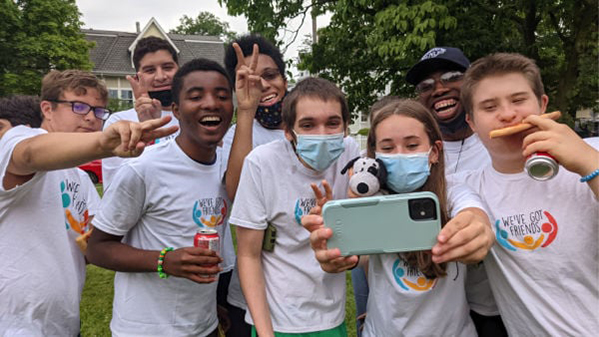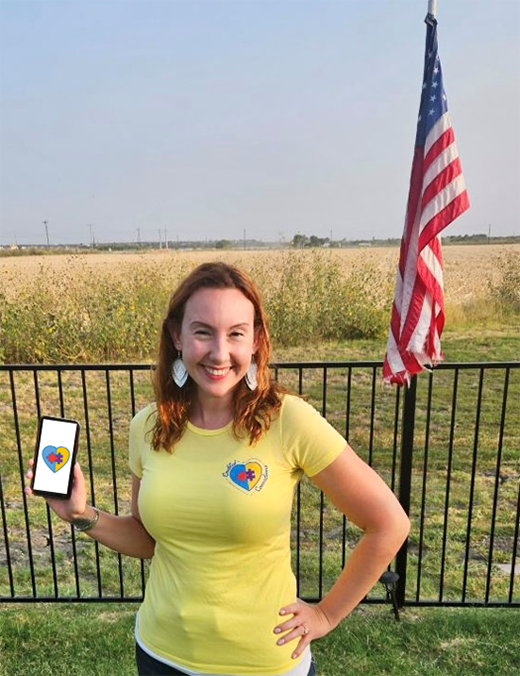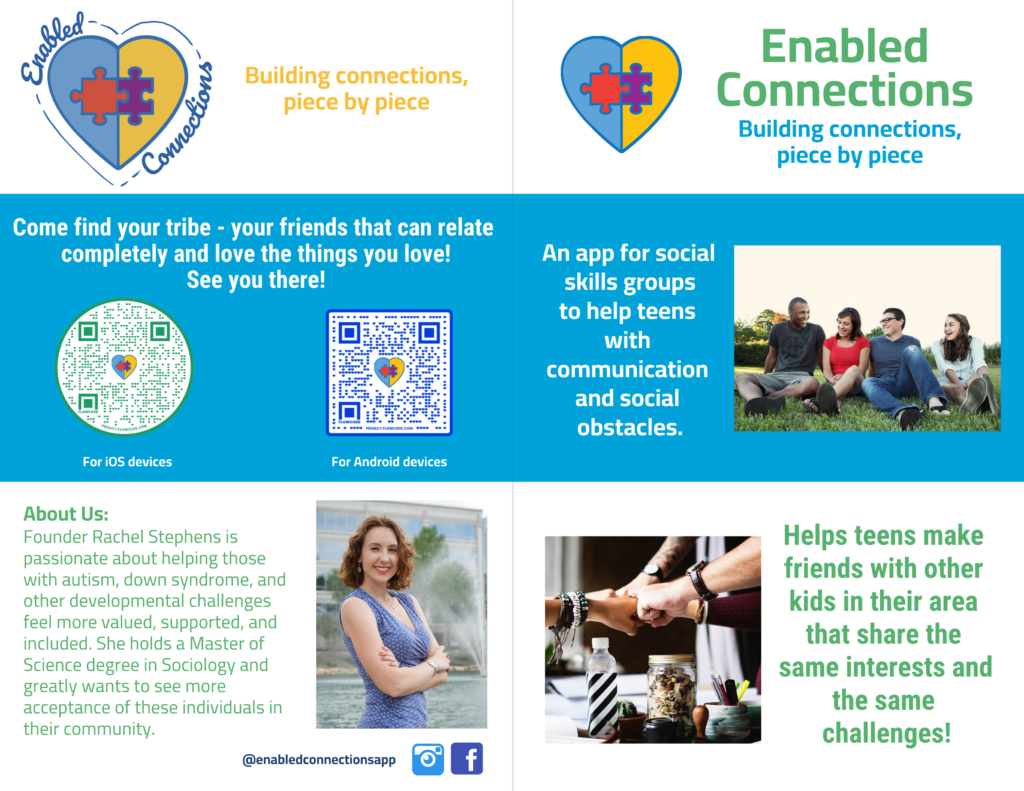Story by Lawson Martin. Photos provided Enabled Connection.
A team of sociologists, therapists, and specialists in Dallas-Fort Worth have created a new app to develop social skills groups for teens with Down syndrome, autism, or other communication challenges.

The app is called Enabled Connections and was recently launched a few months ago for both iOS (Apple) and Android users. Founder Rachel Stephens says the idea just came to her one day when thinking about the impact of school bullies and the difficulties teenagers with developmental disabilities and delays may face in making friends. She wanted to explore ways to help.
Rachel recently graduated with a master’s degree in sociology, and she reached out to practicing clinical professors to see if any organization existed that facilitated social skills groups for people specifically based on their zip codes and interests. The feedback she received was that it was a truly revolutionary and transformative idea. All agreed that this would be incredibly beneficial for kids and loved the concept.

“I thought if I could get teens in the same room that love the same things and are in the same area, maybe they can make some friendships,” Rachel says. “Maybe they can relate to each other in ways no one else can.”
Rachel discovered that there weren’t many social skills groups readily available for teenagers with Down syndrome or autism outside of structured social group activities scheduled by their therapy providers, which led her to create Enabled Connections.
“Individuals with special needs process the world differently, and we know this! We also know that it can be a lonely path to have these needs, and one of the greatest assets to the human psyche is socialization. We all need to find “our tribe.” It has been proven to increase longevity, quality of life, fulfillment, and so much more,” Enabled Connections states on its website.
The app serves individuals who are 13 to 18 years old, though they hope to expand both to younger kids and adults soon. When caregivers sign up for the app, they’ll enter information for their teen, such as their location, interests, concerns, or struggles.
“I can triangulate that data and then create meetups where everyone can get together and start having conversations,” Rachel says. “So not only are they forming friendships, but they’re also practicing social interactions.”

Based on the input in the app, the team at Enabled Connections will curate various events, and participants will get a notification of events happening in their area or pretaining to their interests. The group wants to create a wide variety of events specific to the interests and needs of the users. For example, suppose a group of teenagers have high-functioning autism and are more comfortable in social settings. In that case, Enabled Connections will create a meetup at a movie theater, where they can practice buying movie tickets, interact, and then watch a movie together. For teens with lower-functioning autism, a meetup for these individuals may be coming together in a room to focus primarily on conversational skills and some basic activities.
A representative from Enabled Connections is present at each event, and caretakers must stay with their teenager attending the event. Rachel says this is by design because social skills groups are beneficial not only for teenagers but also for adults.
“The caregivers or parents can connect in these situations and hopefully make friends, too,” Rachel says. “Because everyone in the room can relate to one another in a way that no one else can.”
The app also gives caregivers and teenagers peace of mind because it requires participants to upload a document showing the teenager’s diagnosis during registration so that only those qualified to participate are able to.
Enabled Connections is free in the app store but has a $5.99 monthly fee for the basic membership, which gives caregivers access to the meetups. Then, events are $10 per teenager plus any additional costs an activity might have (such as movie tickets).
The app also offers upgrades, such as the Social Portal upgrade. Parents or caregivers can use this to connect personally in the app. In that case, only if they’ve designated their profile to be searchable they’re able to find and message with one another.
The second upgrade is the Resources Package. It includes the social upgrade plus an extensive list of organizations, therapists, nonprofits, and programs in the Dallas-Fort Worth area for individuals with Down syndrome, autism, or other communication challenges. The resources upgrade also features videos where parents can educate themselves on various topics, including ABA therapy, success stories, exercise ideas, calming sensory activities for teenagers, and more.
The founders at Enabled Connections have a mission to help kids who may struggle to make friends at school or in their community to genuinely find their tribe.
“Finding your tribe just means finding a piece of that joy that you can experience in finding somebody that understands you, that gets you, that’s going to be there for you, no matter what you’re walking through,” Rachel says.
Rachel says she understands that there are many obstacles for parents and teenagers to make these connections.
“I’m not a corporation; I’m not in it for the money,” Rachel says. “I’m in it to bring that joy to people and that resource to people that they wouldn’t easily come across any other way.”
Enabled Connections is available for iOS/Apple users and Android users. Click here to learn more.
Sign up with your email address to receive good stories, events, and volunteer opportunities in your inbox.
Notifications